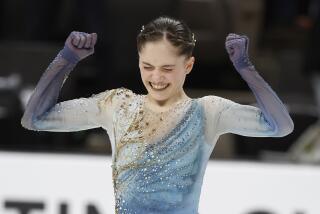Chan wins crowd, but not the judges
- Share via
The scores went up, and Canada’s Patrick Chan responded with the same reaction figure skating fans have had for years.
He scratched his head.
Then Chan put a finger to his lips to discourage the boos that echoed through Staples Center when the spectators saw he was third to Brian Joubert of France and Evan Lysacek of Naperville, Ill., in Wednesday’s short program at the World Figure Skating Championships.
It wasn’t the placement that bothered Chan, 18, the rising star of this figure skating season, who felt he deserved technical mark deductions for some of his spins and footwork.
It was how the robotic Joubert could wind up with higher component scores -- a hybrid version of the old presentation mark that judges still manipulate as it suits them -- than Chan or Lysacek.
“I’m not going to say anything, but. . . . “ Chan said, and then his refreshing candor led him to say what everyone was thinking.
Which is: Simple old 6.0 system or arcane New Judging System, figure skating judges call them as they want to see them.
“Still. Of course,” Chan said. “I think the new system took away some of the judgmental stuff, but it’s still a bit about reputation.”
Jeremy Abbott, the reigning U.S. champion, made big mistakes on two jumps and wound up 10th. Brandon Mroz, second at nationals, is eighth going into today’s free skate final.
The strange thing here was that for all the talk about quadruple jumps, Joubert (84.40) landed a flawed quad while neither Lysacek (82.70) nor Chan (82.55) attempted one.
In the end, the Frenchman leads his two top rivals because of a difference in component scores.
“I’m really disappointed with that,” Chan said. “It’s pretty obvious [there is a] big difference between me and Evan against Joubert. It’s really frustrating for me.
“But he [Joubert] has much more experience at the world level than I do, so I think Evan is going to be even more upset than I am.”
Lysacek, world bronze medalist in 2005 and 2006, actually was so happy about a season-best score for a short program in which he was marked up rather than down for his triple axel jump that he had no public quibbles with the judging.
“He is an amazing athlete who I have looked up to for some years,” Lysacek said of Joubert. “We have different styles, and I appreciate and respect all the different styles.”
Joubert, the 2007 world champion and 2008 silver medalist, did a quad-triple combination in which he put a hand down on the quad and hoochie-coochied out of the landing on the triple, and those mistakes cost him more than three points.
So his combination would be worth less than the triple-triple done cleanly by Lysacek and only a hair more than Chan’s.
“I’m a little disappointed, because I wanted to do a program without errors,” Joubert said. “But I was a bit tense and didn’t get enough speed heading into the quad.
“I have worked very hard at improving the level of my footwork and spins, and it paid off in a lot of points,” Joubert said. “That’s encouraging.”
Or discouraging, if you had the slightest inclination to believe the New Judging System had made figure skating results more believable.
--
More to Read
Go beyond the scoreboard
Get the latest on L.A.'s teams in the daily Sports Report newsletter.
You may occasionally receive promotional content from the Los Angeles Times.






